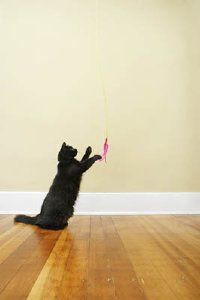How to Treat Cats With Kidney Disease
The kidneys' major job is filtering out wastes. Age, injury, or disease can damage and destroy the function of kidney tissue. The body can adjust to minor kidney damage or the early stages of kidney failure, so there may be no noticeable signs at first.
As damage or failure worsens, a cat produces more urine and drinks more to compensate. In the later stages of failure, the kidneys can't keep up the pace, and wastes back up in the body, poisoning the cat and causing vomiting, loss of appetite, weight loss, and often telltale "ammonia breath."
Advertisement
Unfortunately, once kidney failure reaches this point, it's usually irreversible. The best way to detect a kidney problem is by a blood test. Mature cats and cats that show any signs of early kidney disease should be screened for kidney function.
What to Do
Kidney failure is sneaky. Many times, the symptoms are masked or completely invisible until the damage is critical. The typical cat in kidney failure has already lost about 70 percent of her kidney function by the time she's diagnosed.
Veterinarians sometimes talk about what is called "end-stage" kidney disease when things start getting that bad. This diagnosis is just what it sounds like. Treatment for end-stage kidney disease can prolong the cat's life and make her feel better, but the end is inevitable.
This doesn't mean that every cat showing signs of kidney trouble is doomed. Sometimes, an infection can set in and the kidneys will shut down. Quick treatment can stop the infection and get the cat back on her feet with very little long-term damage.
Watch for the signs. Do you notice your cat drinking more? Has she suddenly quit eating? Is she listless or depressed? Does she seem to be urinating a lot more or barely at all? Does she seem sore over the lower part of her back or sit in a hunched-up "pain crouch"? All of these -- along with vomiting and diarrhea -- are signs of a possible kidney problem or infection.
Get to the vet. Home care for cats with kidney problems is only follow-up care. You need a vet to diagnose the problem, start treatment, and possibly even hospitalize your cat until she's stable.
Do the right thing. You'll probably be given a very strict diet for your cat and possibly some medications. Follow your vet's instructions as if your cat's life depends on it -- because it does.
When to Call the Vet
You should call the vet immediately if any of the warning signs of kidney failure show up in your cat. Other problems have similar symptoms, and only a thorough exam and blood test can determine for sure that it's a kidney problem. The sooner you can catch it, the better the odds will be.
DANGER LEVEL: Kidney failure is extremely dangerous.
Another urinary tract problem that can significantly affect your cat's health is liver disease. We'll learn about the warning signs and symptoms in the next section.
